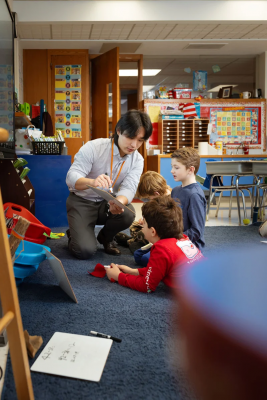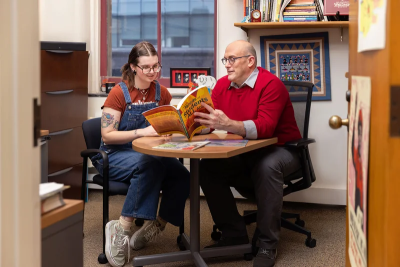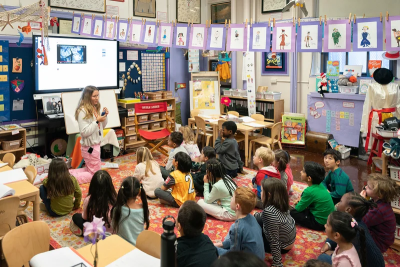
On one of the colorful and crowded walls in Mrs. Touron’s 2nd grade classroom in a school just outside Syracuse, tucked in among posters about math and phonetics and geography, there is a sign that reads: “Fair Isn’t Everyone Gets the Same Thing. Fair Is Everyone Gets What They Need to be Successful.”
This is a perspective that Touron’s student teacher, Ziyun Jin ’23, supports wholeheartedly. A senior in the renowned Inclusive Early Childhood Special Education Program in Syracuse University’s School of Education, Jin has been gaining the skills to help children across a wide spectrum of abilities learn successfully.
Learn more about undergraduate majors in inclusive education
Preparing to Teach All Students

In an inclusive education model, students are not separated based on ability or background. Educators trained to teach in inclusive classrooms modify their instruction to accommodate what each student may need to learn. To explain how this works, Jin draws an analogy between children and flowers. “If a flower doesn’t bloom, we don’t blame the flower—we recognize the problem is in the environment and we look to change things in the environment, so the flower has what it needs to bloom.”
The School of Education was a trailblazer in its commitment to end separation of general education and special education for students with disabilities. In 1991, Syracuse University became the first research institution to establish fully integrated inclusive teacher preparation programs. Students in these programs are trained to teach in inclusive settings and receive dual certification for both general and special education.
Over the decades, the School of Education’s dedication to inclusive education has expanded in scope. “We’re committed to training excellent teachers who are going to be thoughtful about all kids—and with particular attention to kids from populations that have been marginalized, underserved, and discriminated against for any reason, be it race, disability, religion, gender, ethnicity, or economic status,” says George Theoharis, a professor of Educational Leadership and Inclusive Elementary and Early Childhood Education in the School of Education.
Hands-on Training from Day One
Theoharis emphasizes that teachers trained in inclusive education are sought after in all schools, regardless of location or student demographics. “School leaders who hire graduates of Syracuse’s inclusive education program consistently report that they are more prepared than other new teachers,” he says. He attributes this in part to one of program’s distinguishing features—its emphasis on hands-on learning.
Unlike in many other teacher preparatory programs, Syracuse students have classroom placements from their first semester on.

“My field experiences have been incredibly helpful,” says Emma Souky ’24, who studies Inclusive Elementary and Special Education (Grades 1-6). “I have taught now in first, third, and fifth grade classrooms. There is no better way to learn how to be teacher than through doing it, and with every field experience I feel more and more prepared.” Jin seconds this sentiment. “My training in the School of Education has made teaching for diverse needs feel very natural,” he says. “In some school settings, students’ different needs may not be formally recognized, but that doesn’t mean they don’t exist. I now know I’ll be able to provide whatever my students may need.”
In addition to placements in schools in and around Syracuse, students can also spend a semester in New York City with the Bridge to the City program, where they learn in classrooms and schools that exemplify inclusive educational practice—including in Community Roots Charter School in Brooklyn, which was co-founded by School of Education alumna Sara Stone ’99.
“Both schools that I’ve student-taught in during Bridge to the City are rooted in anti-bias approaches with a commitment to diversity and inclusion,” Sarah Feldman ’24 says. “I got to see firsthand the impact a school’s culture can have on staff, students, and their families. My students’ unique life experiences were embraced within the classroom and school communities.” She says the experience helped clarify her goals as an educator. “After I graduate, I hope to work in a school that encourages diversity, teamwork, and respect, and I will strive to make my students feel empowered by their differences.”
Learning in a Supportive Environment

The School of Education’s programs are structured to foster supportive collaboration and camaraderie among students. “The small class sizes mean you really get to bond with your classmates,” Souky says. “There is a huge emphasis on building community, and the professors really take the time to connect with us.”
The close-knit community provides students opportunities to share reflections about their field experiences and, as professors with different specialties often collaborate and sometimes co-teach, students experience professional collaboration modeled by their professors.
Fulfilling the Promise of Our Educational System
Inclusive education aims to live up to what the American education system is supposed to ensure, says Theoharis. “Our system is built on the important ideal that education should be for everybody. But when we label children and see them as deficient, we fail to deliver on that promise,” he says. “My hope will always be that that we will get closer to honoring that promise, and the work we do to prepare educators means our students will be part of that process.”
For Souky, preparing to become an educator in inclusive classrooms has affirmed her choice of career. “To have the opportunity to work in education, and to create a space where kids know that someone believes in them, someone wants the best for them, and that they can be themselves—that is such an honor,” she says.
Learn more about the School of Education’s undergraduate majors, including Inclusive Childhood Education and Inclusive Adolescent Education. For more information, contact us at soeadmissions@syr.edu.
